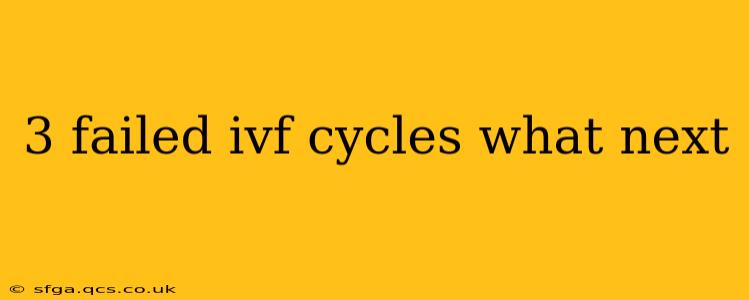3 Failed IVF Cycles: What Next? A Guide to Next Steps and Hope
Experiencing three failed IVF cycles is understandably devastating. The emotional toll, coupled with the physical strain, can leave you feeling lost and unsure of what steps to take next. This comprehensive guide aims to provide information, support, and direction for couples facing this challenging situation. It's crucial to remember that you're not alone, and there are options available. This information is for general knowledge and should not replace consultation with your fertility specialist.
What Causes Repeated IVF Failure?
Understanding the potential reasons behind repeated IVF failures is the first step towards charting a path forward. Several factors can contribute, including:
- Egg Quality: Age is a significant factor impacting egg quality and quantity. Older eggs are more prone to chromosomal abnormalities, hindering successful fertilization and implantation.
- Embryo Quality: Even with healthy eggs and sperm, embryo development can be compromised. Genetic abnormalities, poor morphology (appearance), and developmental issues can lead to implantation failure.
- Endometrial Receptivity: The uterine lining must be optimally prepared to accept and nurture a developing embryo. Conditions like endometriosis, uterine fibroids, or polyps can impair receptivity.
- Immune System Issues: Certain immune system conditions can interfere with successful implantation.
- Unexplained Infertility: In some cases, despite extensive testing, no clear cause for infertility is identified.
- Male Factor Infertility: While egg and embryo quality are often the focus, male factor infertility, including low sperm count or motility, can significantly impact IVF success rates.
What Tests Should I Consider After Multiple Failed IVF Cycles?
After three unsuccessful cycles, a comprehensive reevaluation is crucial. Your fertility specialist might recommend further testing to identify any underlying issues that may have been missed previously:
- Advanced Embryo Testing (PGT): Preimplantation genetic testing (PGT) screens embryos for chromosomal abnormalities before implantation. This can significantly increase the chances of success by selecting genetically healthy embryos. There are different types of PGT testing, including PGT-A (aneuploidy testing), PGT-M (monogenic disease testing), and PGT-SR (structural rearrangement testing). Your doctor will advise which is most appropriate.
- Endometrial Biopsy: This procedure examines the uterine lining to assess its receptivity and identify potential problems.
- Immunological Testing: This assesses the role of the immune system in implantation failure.
- Detailed Semen Analysis: A thorough evaluation of the male partner's semen, potentially including advanced sperm testing.
- Hormone Panel: A more detailed assessment of hormonal imbalances that could impact IVF success.
What are My Options After 3 Failed IVF Cycles?
While the path forward depends on individual circumstances and test results, several options may be considered:
- IVF with PGT: As mentioned, preimplantation genetic testing can greatly improve success rates.
- Donor Eggs: Using donor eggs eliminates potential issues related to egg quality and chromosomal abnormalities.
- Adoption: This is a fulfilling path for couples who desire parenthood.
- Surrogacy: This involves another woman carrying the pregnancy.
- Change Clinics or Doctors: Seeking a second opinion from a different fertility clinic or specialist could offer fresh perspectives and potential alternative treatment plans.
- Taking a Break: Emotional and physical rest can be beneficial before attempting further IVF cycles.
What is the Success Rate After 3 Failed IVF Cycles?
The success rate after three failed IVF cycles varies significantly depending on the underlying cause, age, and chosen treatment approach. It's vital to discuss realistic expectations with your fertility specialist based on your specific situation. While the chances may be lower than in previous cycles, success is still possible.
How Can I Cope Emotionally After Multiple IVF Failures?
The emotional toll of repeated IVF failures is immense. Seeking support is crucial:
- Therapy: A therapist specializing in infertility can provide emotional support and coping mechanisms.
- Support Groups: Connecting with other couples facing similar challenges can offer comfort and shared understanding.
- Family and Friends: Lean on loved ones for emotional support.
When Should I Consider Stopping IVF Treatments?
The decision to stop IVF treatments is deeply personal. There's no right or wrong answer. Consider factors like emotional and financial resources, age, and overall health. Open communication with your partner and fertility specialist is essential in making this decision.
Remember, navigating infertility is a challenging journey. Prioritize your mental and physical health. Seek professional guidance and support, and remember that there are options available even after multiple failed IVF cycles. Hope remains, and finding the right path forward is possible with the right support and information.
